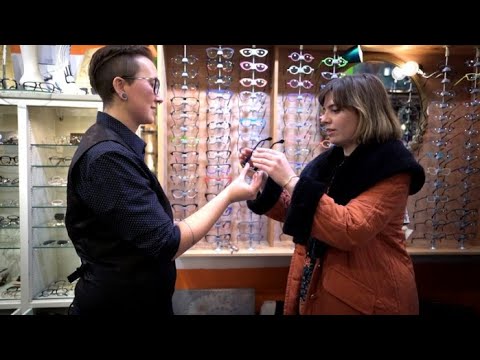Career Overview
Opticians fit clients with prescription eyeglasses or contact lenses, help clients select eyeglass frames, arrange for the production of eyeglasses or contact lenses and mount lenses in eyeglass frames. Student opticians and opticians who are managers of optical retail outlets are included in this group.
People in this career:
- Do automated refractions (sight tests)
- Work in optical retail outlets or other establishments with optical dispensing departments
- May be self-employed
- Must have basic analytical skills, knowledge of computers and the ability to measure according to specifications
- Should also have good communication and interpersonal skills in order to work with customers and provide explanations about eyewear
Job Titles
Duties
Opticians perform some or all of the following duties:
- Get specifications for eyeglasses or contact lenses from a prescription prepared by an ophthalmologist or optometrist or by analyzing clients' eyeglasses or contact lenses and measuring clients' eye curvature, pupillary distance and bridge width, using optical measuring devices
- Help clients to select eyeglasses by advising on lens materials, frames, tints and anti-reflection coating
- Advise on use and care of contact lenses
- Arrange for grinding and polishing of lenses or grind and polish lenses
- Cut and edge lenses and fit lenses into frames
- Adjust finished eyeglasses to fit clients
- May supervise or manage the activities of other opticians or student opticians
Earnings
Earnings is income that workers receive in exchange for their labour. Depending on the type of employment, earnings can be in the form of wages (hourly), salaries (fixed monthly or annual) or self-employed earnings.
Work Environment
# Workers Employed
1,345% Employed Full Time
43%Most opticians work a regular 35- to 40-hour week. Depending on the type and location of the business, opticians may be required to work evenings and weekends.
Opticians work indoors in well-lit, comfortable surroundings. They may work in physicians’ offices, health-care practices, medical laboratories, small stores or large optical chain stores with several other opticians.
Job hazards for opticians may include contact with harmful chemicals and injuries from cutting glass, so safety precautions are taken.
Career Pathways
Opticians may need additional training in order to become licensed contact lens fitters.
With additional experience, opticians may progress to supervisory or management positions or start their own businesses.
Occupational Interests
It’s important to understand what kinds of occupations align with your interests.
For more about occupational interests visit Skills for the Future Workforce > Characteristics.
Here are the top occupational interest(s) for this career profile:
Education, Training and Skills
Completion of an accredited optician program at an institution recognized by the College of Opticians of British Columbia (COBC) is required. Graduates must also pass a national licensing examination administered by the COBC in order to become a Registered Optician.
Certificates of registration are issued for the following registration classes:
- Registered Optician – Eyeglass Dispensing
- Registered Optician – Contact Lens and Eyeglass Dispensing
- Registered Optician – Contact Lens Student
- Registered Optician – Non Practicing
For more information, visit the COBC website at www.cobc.ca.
Opticians are required under provincial regulation in B.C. to receive specialized training before they can conduct automated refractions (sight tests).
Opticians who are certified for that occupation by a regulator elsewhere in Canada can apply for the same certification from the regulator in B.C. Under the terms of the Canadian Free Trade Agreement (CFTA), most applicants who are transferring their credentials from elsewhere in Canada will not be required to complete additional training or testing. However, the B.C. regulator may ask applicants to provide further information such as a letter of good standing, references, or criminal record check.
For those who trained outside of Canada and never received certification from any Canadian jurisdiction, a full assessment is likely needed. Most occupational regulators have a process for assessment and recognize internationally trained applicants.
Contact the College of Opticians of BC for details on how to apply for certification in B.C.
For information about labour mobility in Canada, visit www.workersmobility.ca.
View a list of Professional Regulatory Authorities in B.C.
Education programs in B.C.

Top Skills
Every job calls for a certain set of skills. Knowing those skills is the first step in finding a good career fit.
Here, you will find the 10 most relevant workplace skills. Some are more important to achieving success in a certain career than others. These skills may come naturally to you or you may need to gain them through education, training and experience.
See the list of work-related skills below, ranked in order of importance for this career. Check out the list and see if this career matches your skills—take that first step!
Talking to others to share information effectively.
Giving full attention to what other people are saying, taking time to understand the points being made, asking questions as appropriate, and not interrupting at inappropriate times.
Understanding written sentences and paragraphs in work-related documents.
Using logic and reasoning to identify the strengths and weaknesses of alternative solutions, conclusions or approaches to problems.
Actively looking for ways to help people.
Communicating effectively in writing as appropriate for the needs of the audience.
Adjusting actions in relation to others' actions.
Convincing others to change their mind or behaviour.
Being aware of others’ reactions and understanding why they react as they do.
Understanding how new information could be used to solve current and future problems in making decisions.
Labour Market Statistics
Discover data, facts and information that have been gathered and analyzed. Learn about the characteristics of the economy and labour market in B.C.
Employment
Find out about employment types and trends by region and industry.
Employment
1,345Employment by Region







| Region | Employment | % Employment of this Occupation |
|---|---|---|
| Cariboo | 40 | 3.0% |
| Kootenay | 20 | 1.5% |
| Mainland/Southwest | 885 | 65.8% |
| North Coast and Nechako | 10 | 0.7% |
| Northeast | 0 | 0.0% |
| Thompson-Okanagan | 185 | 13.8% |
| Vancouver Island/Coast | 205 | 15.2% |
Labour Market Outlook
The B.C. Labour Market Outlook is a 10-year forecast of the expected supply and demand for labour in the province. It’s usually updated every year. The purpose is to provide British Columbians with the knowledge to make informed decisions on careers, skills training, education and hiring.
Forecasted Job Openings (2025-2035)
660Forecasted Job Openings
Forecasted Employment Growth Rate
Composition of Job Openings
Job Openings by Region (2025-2035)







| Region | Job Openings | Avg. Annual Employment Growth |
|---|---|---|
| Cariboo | 10 | -0.1% |
| Kootenay | 10 | 1.5% |
| Mainland/Southwest | 450 | 1.3% |
| North Coast and Nechako | Not available | Not available |
| Northeast | Not available | Not available |
| Thompson-Okanagan | 90 | 1.4% |
| Vancouver Island/Coast | 90 | 1.0% |
Industry Highlights
Learn about the opportunities in B.C.'s major industries, including employment trends, earning potential, locations of work and more.
Forecasted Job Openings by Industry
| Industry | Job Openings (2025-2035) |
|---|---|
| Retail Trade | 410 |
| Health Care and Social Assistance | 240 |
| Manufacturing | 10 |
Insights from Industry
Job openings will come from retirements and new job creation.
The demand for optical services is rising due to provincial population growth and aging. British Columbia’s growing population will require more optical products, such as glasses and contact lenses. In addition, as B.C.'s population ages, a larger portion of the population will need enhanced vision aids such as corrective lenses and bifocal contact lenses.
Also, with the large number of people using computers in their jobs, special "task-specific" lenses help reduce eye fatigue, further maintaining the need for opticians.
Another trend that may positively affect the demand for opticians is the increased interest in eyewear as a fashion accessory, which may mean more people will visit opticians for specialty optical products.
Resources
-
College of Opticians of British Columbia (COBC)www.cobc.ca/
-
National Association of Canadian Optician Regulators (NACOR)www.nacor.ca/
-
Opticians Association of Canada (OAC)www.opticians.ca/
-
Opticians Association of Canada, British Columbia Chapterwww.opticians.bc.ca/
-
Opticians Council of Canadabecomeanoptician.com/








